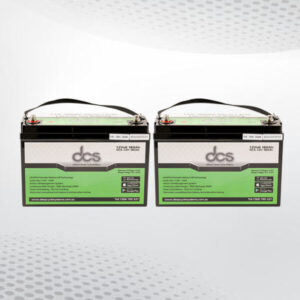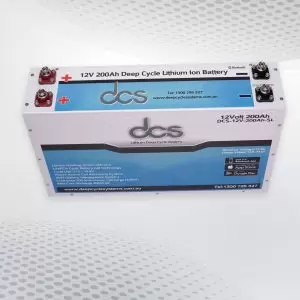With the increasing concern for the environment and the rising energy cost, more and more people are turning towards renewable energy sources like solar power. One of the most efficient ways to harness solar energy is lithium solar battery. These batteries have gained popularity due to their high energy density, long lifespan, and low maintenance requirements. But to truly maximize their efficiency, some tips and tricks can be followed. In this blog post, we will discuss tips to help you get the most out of your lithium-ion solar battery and go green.
Understanding Lithium-Ion Solar Batteries: A Closer Look
Lithium-ion solar batteries are becoming increasingly popular for harnessing solar energy due to their numerous advantages. To understand these batteries better, let’s closely examine their key features and functioning.
 Lithium-ion batteries are known for their high energy density, meaning they can store a significant amount of energy in a compact size. This makes them perfect for solar power systems where space may be limited.
Lithium-ion batteries are known for their high energy density, meaning they can store a significant amount of energy in a compact size. This makes them perfect for solar power systems where space may be limited.- Lithium-ion batteries have a long lifespan compared to other battery technologies. They can withstand numerous charge-discharge cycles without significant capacity loss, ensuring a reliable and durable energy storage solution for your solar system.
- Lithium-ion batteries require minimal maintenance. Unlike other batteries, they don’t require regular watering or equalization. This reduces the overall maintenance cost and effort required to keep your solar system running efficiently.
- Lithium-ion batteries have a high charging and discharging efficiency, ensuring you can maximize the solar energy harvested. They can efficiently store and release energy, maximizing the performance of your solar power system.
How to Optimize Your Lithium-Ion Solar Battery for Better Efficiency
To maximize the efficiency of your lithium-ion solar battery, there are a few key tips and tricks to keep in mind. It’s important to ensure that your solar panels are properly installed and positioned to receive maximum sunlight exposure throughout the day. This will ensure that your battery is consistently charged with the maximum amount of solar energy. Monitoring and managing your battery’s charge level is essential. Avoid completely draining your battery, as this can significantly reduce its lifespan. Instead, keep the battery’s charge level between 20% and 80% to optimize its performance and longevity.
Another tip to enhance your battery’s efficiency is to minimize energy wastage. This can be achieved by using energy-efficient appliances and ensuring your home is well-insulated to prevent unnecessary energy loss. It’s crucial to regularly inspect and clean your solar panels to remove any dirt or debris that may hinder their performance. Clean panels can absorb more sunlight, resulting in a more efficient charging process for your battery. Consider investing in a solar charge controller. This device regulates the flow of electricity from the solar panels to the battery, preventing overcharging and prolonging the battery’s life.
Maintenance Tips for Long-Lasting Lithium-Ion Solar Battery
There are a few key tips to remember when it comes to maintaining your lithium-ion solar battery.
- It’s crucial to inspect and clean your battery regularly. Check for any signs of damage or wear and tear, such as corrosion or leaking. If you notice any issues, it’s best to address them immediately to prevent further damage.
- It’s important to keep your battery in a cool and dry environment. Excessive heat or moisture can negatively impact the performance and lifespan of your battery. Avoid storing your battery in direct sunlight or extreme temperatures, which can lead to overheating or freezing.
- Another maintenance tip is to avoid overcharging or overcharging your battery. This can cause stress on the battery and reduce its overall lifespan. Use a reliable charge controller to regulate the charging process and ensure your battery is never fully drained or overcharged.
- It’s essential to follow the manufacturer’s guidelines for maintenance and usage. This may include specific instructions for charging, storage, and handling.
By adhering to these guidelines, you can maximize the lifespan of your lithium-ion solar battery and enjoy reliable and efficient energy storage for years to come.
Safety Precautions When Handling Lithium-Ion Solar Batteries
When it comes to handling lithium-ion solar batteries, safety should always be a top priority. These batteries are powerful energy storage devices and require careful handling to prevent any accidents or damage. Here are some essential safety precautions to keep in mind:
Proper storage:
Store your lithium-ion solar batteries in a cool, dry place away from direct sunlight or extreme temperatures. Avoid exposing them to moisture or high humidity, leading to damage or corrosion.
Avoid physical damage:
Handle your batteries carefully and avoid dropping or damaging them. Even a small physical impact can cause internal damage to the battery, leading to a potential risk of leakage or fire.
Use approved chargers and accessories:
Only use chargers and accessories specifically designed for lithium-ion batteries. Using incompatible or counterfeit chargers can cause overcharging, overheating, or even explosions.
Prevent overcharging and over-discharging:
Do not leave your batteries plugged in for an extended period after fully charging. Similarly, avoid completely discharging your batteries. Both scenarios can reduce their lifespan and potentially cause safety hazards.
Avoid exposing batteries to extreme temperatures:
Extreme heat or cold can affect the performance and safety of lithium-ion batteries. Please do not leave them in your car on hot or freezing days.
Maximizing the Lifespan of Your Solar Lithium Battery
One of the key factors in getting the most out of your solar lithium battery is maximizing its lifespan. Following a few simple practices ensures that your battery remains efficient and functional for years.
- It’s important to monitor the temperature of your battery regularly. High temperatures can have a detrimental effect on its lifespan. If your battery is consistently getting too hot, consider relocating it to a cooler area or implementing additional cooling measures.
- Avoid deep discharges whenever possible. While lithium-ion batteries are designed to handle multiple charge-discharge cycles, deep discharges can significantly reduce their lifespan. Keep your battery’s charge level between 20% and 80% to maximize its longevity.
- It’s crucial to store your battery properly when not in use. Extreme temperatures and high humidity can lead to corrosion and damage. Find a cool, dry location to store your battery, away from direct sunlight and any potential hazards.
- Regularly perform maintenance checks on your battery to ensure it remains in good condition. Clean the terminals and check for any signs of damage or wear. Address any issues promptly to prevent further damage.
Exploring the Best Practices for Lithium-Ion Solar Battery Storage
When it comes to storing your lithium-ion solar batteries, some best practices can help ensure their longevity and efficiency. Those in a cool and dry environment is important. Extreme temperatures can hurt battery performance and can even lead to irreversible damage. So, find a suitable storage location away from direct sunlight, excessive heat, and high humidity. It’s crucial to store your batteries in a well-ventilated area. Lithium-ion batteries release small amounts of gas during their normal operation, and proper ventilation can help dissipate these gases and prevent any buildup that could be potentially dangerous.
When storing your batteries, keeping them in a stable position and away from any flammable materials is also recommended. Accidental damage or leakage can lead to the release of flammable gases, so it’s important to minimize the risk by storing your batteries safely. Regularly check on your stored batteries to ensure they are in good condition. Inspect for any signs of damage or wear; if you notice any issues, address them immediately.
Common Misconceptions about Lithium-Ion Solar Batteries
Lithium-ion solar batteries are an excellent choice for efficient energy storage, but some common misconceptions must be debunked.
Misconception 1: Lithium-ion batteries are not safe
Contrary to this belief, lithium-ion batteries are safe when handled properly and used with approved chargers and equipment. Following safety guidelines and avoiding mishandling or using incompatible chargers is important to prevent potential risks.
Misconception 2: Lithium-ion batteries have a short lifespan
With proper care and maintenance, lithium-ion batteries can last for many years. Some models even have a lifespan of over a decade, making them a reliable and long-lasting energy storage solution.
Misconception 3: Lithium-ion batteries cannot be recycled
While it is true that recycling lithium-ion batteries can be more challenging compared to other types, there are recycling facilities that specialize in safely recovering valuable materials from these batteries. It’s essential to dispose of lithium-ion batteries properly to minimize environmental impact.
Misconception 4: Lithium-ion batteries always overheat or catch fire
While there have been rare instances of lithium-ion batteries overheating or catching fire, these incidents are typically the result of mishandling or using faulty equipment. Lithium-ion batteries are safe and reliable when used correctly and with approved chargers.
FAQs
Are lithium-ion solar batteries safe to use?
Absolutely! While mishandling or using improper chargers can pose safety risks, lithium-ion batteries are safe and reliable when handled correctly and used with approved equipment.
How long do lithium-ion batteries last?
With proper care and maintenance, lithium-ion batteries can last for many years. Some models even have a lifespan of over a decade, making them a long-lasting and sustainable energy storage solution.
Can lithium-ion batteries be recycled?
Although recycling lithium-ion batteries can be more challenging compared to other types, there are recycling facilities that specialize in safely recovering valuable materials from these batteries.
Do I need a solar charge controller for my lithium-ion battery?
While not necessary, a solar charge controller can help regulate the flow of electricity from the solar panels to the battery, preventing overcharging and extending the battery’s life.
How should I store my lithium solar battery when not in use?
It’s important to store your battery in a cool, dry place away from direct sunlight, excessive heat, and high humidity. Ensure it is stored in a stable position and away from flammable materials.
Conclusions
Optimizing your lithium-ion solar battery can significantly impact your energy storage system’s efficiency and lifespan. This blog post provides valuable tips and tricks to help you get the most out of your battery while promoting sustainability and going green. It is crucial to prioritize safety, follow maintenance guidelines, and implement best practices for storage to ensure reliable and efficient energy storage for years to come. With these practices in place, you can reduce your carbon footprint and enjoy the benefits of renewable energy.

